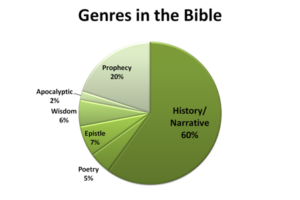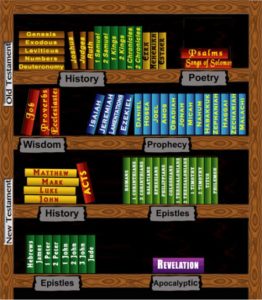By: Brian Chilton | February 21, 2017
Biblical interpretation is not always easy. Unfortunately, many of the attacks against Christianity come from improper interpretation by both antagonists of the faith and proponents of the faith. Sadly, many Christian teachers and preachers have been guilty of improper interpretation. So is there a good method for interpreting the Bible? Stemming from over 14 years in ministry coupled with my theological education, I would like to present to you five steps that will help you to properly interpret the Bible.
Step 1: Understand the text’s message.
The first step to biblical interpretation is to understand what the author was trying to say to the people of his time. Some will claim, “Yes, but can’t I find truths that are applicable to me?” Yes! Absolutely! However, we must realize that while the Bible was written for all of God’s people, the authors of the 66 books of Scripture did not have us in mind. The authors were writing to the people of their day about particular issues of their time. In order to understand the Bible properly, one must first allow the author to say what he is actually saying.
Step 2: Understand the text’s context.
Context, context, context!!! In order to understand anything, you must keep the text in context. Quite honestly, a person can make the Bible say anything they want if they do not keep the text in context. For instance, the Bible says, “There is no God.” It’s true! Atheists may gloat, saying, “See! Your Bible says there is no God!” However, if the text is put in its proper context, one finds that the psalmist actually says, “The fool says in his heart, ‘There is no God’” (Psalm 14:1). There is a major difference between the text taken out of context compared to the text found in its completed form. Too often leaders (pastors and teachers alike) quote bits of Scripture without placing the text in its proper context. Just as Psalm 14:1 can be made to say something very different than it was intended to say by taking a segment out of context, the rest of Scripture can be manipulated to purport ideas foreign to the biblical writers. Unfortunately, many false doctrines have entered the church because of this practice.[1]
Step 3: Understand the text’s background.
The interpreter is separated from the times of the Bible by at least 2,000 years. A greater separation of time is found between the modern interpreter and patriarchal times of the Old Testament. Thus, it is critical for modern interpreters to understand the culture and the times of the author and the listeners of the text in question. Background studies take a bit of work. Who was the author? To whom did the author write? When was the text written? What was the historical situations of the time? How would the original readers and listeners of the text have understood the message? Would you think that a preacher who would be correct if he claimed that Jeremiah sat down with his laptop, wrote out the biblical text, and then sent all the people of Judah an email with his text? Of course not! Such a notion is absurd! Why? It is because we know that Jeremiah did not have such technology in his time. If we do not allow for proper background studies in our interpretation of the biblical text, we could be guilty of assumptions just as irrational.[2]
Step 4: Understand the text’s genre.
The Bible is not one book, but rather a collection of books. The Bible consists of 66 books written by over 40 authors over the course of at least 2,000 years. By the amazing work of God’s inspiration, the Bible does hold grand themes throughout the entirety of the biblical collection. However, the authors employ various genres to document their message. At least 6 genres are found in the Bible.

Around 60% of the Bible is historical narrative. The historical narrative genre records events of history in a literal and factual manner. In other words, narrative documents the historical record of particular events and of particular people in space and time. Biblical narrative often purports God’s activity in history. There are many subgenres in this category. The Gospels are considered biography. Acts and the historical books of the Old Testament are considered historical books. The first five books of the Bible (Genesis, Exodus, Leviticus, Numbers, and Deuteronomy—especially the last four) are of the law genre.
Prophecy comprises the next highest amount of Scripture. Prophecy comes from the mouth and pen of prophets of bygone days. Prophets were spokesmen for God. They delivered a pertinent message for the people of their time. Contrary to popular belief, prophets were primarily forth-tellers in that they preached a message of hope and judgment to the people of their time. However, prophets were occasionally foretellers in that they predicted events that were to come to pass.
Around 7% of Scripture is in the genre known as epistolary. Epistles were letters written by individuals addressed to particular people and/or churches. Epistles are especially found in the New Testament. Paul the apostle wrote the majority of the epistles in the New Testament with John, Peter, James, and Jude also contributing.
The Bible also consists of wisdom literature which consists of around 6% of the total biblical text. Wisdom literature is found in Job, Proverbs, and Ecclesiastes. Much of the wisdom literature operates as the Proverbs. They provide general statements about life about the way things normally are. Proverbs, especially, are not meant to discuss all the possible variations that happen in life. They are short, pithy statements pertaining to life in general. Thus, interpreters are erroneous to think that the wisdom literature describes life as it exists 100% of the time.

The Bible also holds the poetry genre which comprises around 5% of the biblical text. The Psalms hold the largest portion of poetry. A psalm is a song. Thus, the psalmists wrote their psalms in rhymnic patterns as found in the Hebrew text. The psalmists evoke emotion in their texts. The psalmists experienced great trials at times. Other times they experienced great bliss. Biblical poetry captures their emotional state.
Finally, the Bible consists of the apocalyptic genre. About 2% of the Bible is apocalyptic. Apocalyptic writings are concerned about the end times. God is shown to conquer evil and to provide a good, heavenly home for his children. Apocalyptic writings employ a great deal of symbolism and allegory to teach literal truths. For instance, in Revelation 5:6, Jesus, identified as the Lamb, is said to have “seven horns and seven eyes.” Does John really indicate that in heaven Jesus will have seven literal eyes and seven literal horns upon his head? No! The number 7 represents completion or perfection. The horn is a symbol of strength, whereas the eye was a symbol of wisdom. Thus, John is actually stating that Jesus has perfect strength and perfect wisdom. In other words, Jesus is both omnipotent and omniscient. The book of Revelation is the clearest example of apocalyptic literature. However, the genre is also found in parts of Ezekiel, Zechariah, and Isaiah. Understanding the text’s genre goes a long way in providing a proper biblical interpretation.
Step 5: Understand the text’s application.

Finally, after the text is understood, the interpreter can apply applications from the text to his or her life and times. Application should only come after the previous steps are used. Ask yourself, “How do the issues of the text relate to modern times?” “What universal truths are found in the text?” Application is important. It is here that we cross the bridge from antiquity to modernity. However, application comes last in our five-step plan.
Conclusion
To say that we have only scratched the surface is a major understatement. Much more can be said concerning biblical interpretation. Hopefully this article will prevent a laissez-faire attitude towards biblical interpretation. Because, if a person does not properly interpret the Word of God, he or she is not properly handing the Word of Truth. Bad interpretations are guilty of adding and taking away truths to the infallible Word of God. May we all be found to be good interpreters of God’s Word.
Note: A great book on the issue of biblical interpretation is How to Read the Bible For All Its Worth by Gordon D. Fee and Douglas Stuart (Grand Rapids: Zondervan, 2003). I highly recommend this book.
 Brian Chilton is the founder of BellatorChristi.com and is the host of The Bellator Christi Podcast. He received his Master of Divinity in Theology from Liberty University, his Bachelor of Science in Religious Studies and Philosophy from Gardner-Webb University, received certification in Christian Apologetics from Biola University, and hopes to work on doctorate studies soon. Brian is the pastor of Huntsville Baptist Church in Yadkinville, North Carolina.
Brian Chilton is the founder of BellatorChristi.com and is the host of The Bellator Christi Podcast. He received his Master of Divinity in Theology from Liberty University, his Bachelor of Science in Religious Studies and Philosophy from Gardner-Webb University, received certification in Christian Apologetics from Biola University, and hopes to work on doctorate studies soon. Brian is the pastor of Huntsville Baptist Church in Yadkinville, North Carolina.
Notes
[1] Throughout history, this practice has been found. Exegesis means that the interpreter allows the text to speak for itself. Eisegesis means that the interpreter forces his or her opinions into the text. One of the more tragic examples of eisegesis is found in colonial America where interpreters claimed that the Bible endorsed slavery. Proper interpretation shows that such claims were unsound.
[2] The term “anachronistic” is used when something is interpreted out of its time. For instance, it would be anachronistic to claim that Moses worshipped at Solomon’s Temple. Moses lived far earlier than Solomon and, thereby, would not have been able to worship at Solomon’s Temple since it had not yet been built.
© February 21, 2017. Bellator Christi.






If I may, I would like to share an article about Bible translation options that do not honor the original text, add bias to it’s understanding and fuel extrabiblical traditionalism: https://vidaemabundancia.blogspot.com/2024/07/traducoes-e-tradicoes.html (The article is in portuguese, but you may activate the automatic translation at the right top menu.)